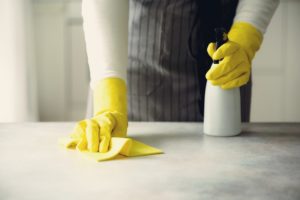 Keeping your home clean can minimize your exposure to various asthma triggers such as dust and mold. However, some household cleaning products contain harmful chemicals that can induce asthma symptoms.
Keeping your home clean can minimize your exposure to various asthma triggers such as dust and mold. However, some household cleaning products contain harmful chemicals that can induce asthma symptoms.
Certain cleaning products are known to release volatile organic compounds (VOCs) in the air while they are being used. VOCs are dangerous gases that can cause adverse reactions, and contribute to chronic respiratory problems. According to the American Lung Association (ALA), “Cleaning supplies and household products containing VOCs and other toxic substances can include, but are not limited to: aerosol spray products, chlorine bleach, detergent and dishwashing liquid, rug and upholstery cleaners and oven cleaners.”
The ALA also warns people with asthma and other chronic respiratory health problems against the use of products that contain a mixture of bleach and ammonia. This harmful combination is a known asthma trigger. In some cases, symptoms that result from the use of both products can lead to death.
One of the most effective ways to avoid using harmful household products is to carefully read their labels. Purchase products that contain zero or reduced amounts of VOCs, irritants or fragrances. The ALA recommends using milder products such as baking soda, vinegar, borax, or lemon juice to make alternative and safer cleaning solutions. If you must use a chemical product choose those that are certified green by reputable organizations such as the Environmental Protection Agency (EPA). Follow the manufacturer’s instructions and wear protective masks and gloves.
It is also important to keep in mind that while you are cleaning to keep your area well ventilated. Do not use products in an enclosed area; open your windows and doors. Proper ventilation reduces the effects that poor air quality can have on your health.
For additional information on safe ways to clean your home, visit the American Lung Association’s website at www.Lung.org
To schedule an appointment with a doctor at Flushing Hospital, please call 718-670-5486.
All content of this newsletter is intended for general information purposes only and is not intended or implied to be a substitute for professional medical advice, diagnosis or treatment. Please consult a medical professional before adopting any of the suggestions on this page. You must never disregard professional medical advice or delay seeking medical treatment based upon any content of this newsletter. PROMPTLY CONSULT YOUR PHYSICIAN OR CALL 911 IF YOU BELIEVE YOU HAVE A MEDICAL EMERGENCY.
